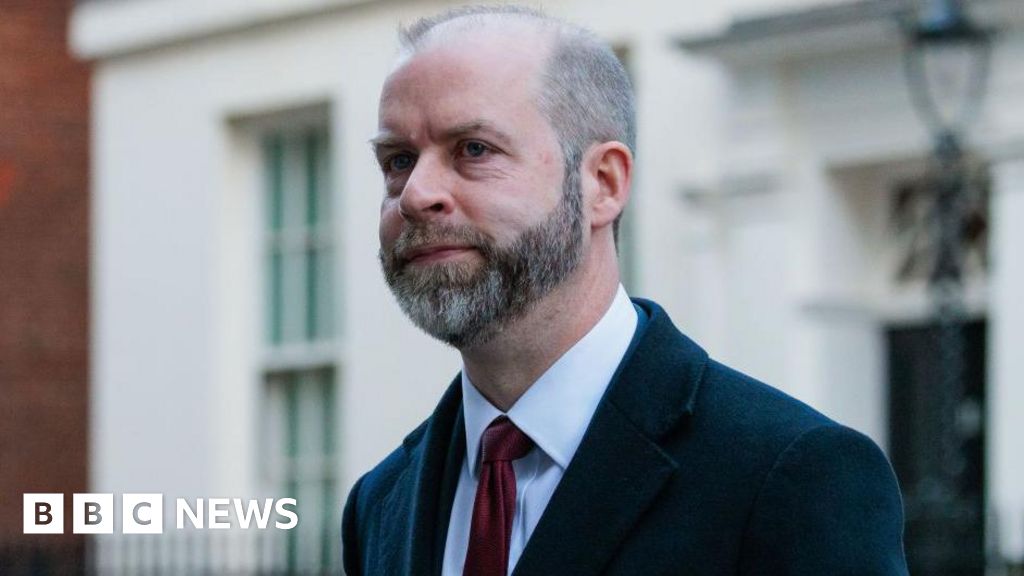The UK should be excluded from the tariffs Donald Trump is threatening to impose on exports to the US, the business secretary has said.
Jonathan Reynolds told the BBC that the US has no goods trade deficit with the UK, which occurs when a country imports more than it exports.
President Trump has doubled down on his threat to impose big tariffs on countries that sell products in the US.
“I think we’ve got an argument to engage with,” Reynolds said.
The prospect of higher taxes being introduced on imports to the US is concerning many world leaders because it will make it more expensive for companies to sell goods in the world’s largest economy.
Trump told global executives at the World Economic Forum on this week that they could either produce their goods in the US or face widespread tariffs worth hundreds of billions or even trillions of dollars.
But Reynolds said when it comes to manufactured goods, the US did not have a trade deficit with the UK.
“We know this is something that not just President Trump, but the whole of his administration takes very seriously,” he said.
“We’ve obviously got a services-based economy. The US does not have that deficit with us so if that’s the logic of that position, I think we’ve got an argument to engage with.”
Tariffs are a central part of Trump’s economic vision. He sees them as a way of growing the US economy, protecting jobs and raising tax revenue but he also uses them as leverage to pursue other policies.
He has already said he is considering imposing a 10% tax on imports from China as soon as 1 February, claiming the country is sending fentanyl, a synthetic opioid, to Mexico and Canada.
Trump had also threatened 25% tariffs on Canada and Mexico, again citing fentanyl as well as immigration among his concerns.
However, Trump has since said he “would rather not” impose tariffs, suggesting a trade deal could be on the table.
Separately, the business secretary said the UK had left open the possibility of following EU rules for food and farm products in order to return to frictionless access to European markets.
Reynolds said such an agreement – which lowers all trade barriers in return for mirroring EU rules and standards – would not cross the government’s red lines.
The comments came after EU Trade Commissioner Maros Sefcovic told the BBC a new agreement, including so-called dynamic alignment on standards, is possible alongside other areas of pan-European co-operation on customs.
Reynolds met Sefcovic at the World Economic Forum in Davos on Thursday and said he thanked his EU counterpart for his “incredibly positive” and “helpful” comments.
Reynolds added that Sefcovic’s tone was in keeping with what the government had already said about a “twin-track strategy” on trade.
“We can improve the terms of trade with the EU in a way which doesn’t revisit customs unions or single markets or the arguments of Brexit, and we can do that whilst pursuing closer trade links around the world,” Reynolds said.
Labour fought last year’s UK general election with a manifesto pledge to lower Brexit-related barriers and red tape for the export of food and farm products to the European Union.
The question has always been how deep such an agreement might be. It could be settled in the coming weeks, though firm decisions have not yet been made.
On Thursday the EU suggested to the BBC that complete eradication of barriers in the sector would be possible if the UK followed relevant EU rules and standards as they change, a process known as “dynamic alignment”.
Reynolds said that both ideas floated by Sefcovic – a fully fledged veterinary agreement with dynamic alignment and a pan-European customs plan – did not break the government’s red lines.
But the Conservatives have voiced anger at reports of a potential new deal on UK-EU trade, with shadow foreign secretary Dame Priti Patel telling MPs that the government was “bending the knee to the EU”.
“These latest reports that the government might shackle us to the European Union are deeply concerning, and once again make clear that Keir Starmer and his chums are all too happy to put their ideology ahead of our national interest, no matter the cost,” she said.
The Liberal Democrats have said the government is not doing enough to smooth trade with the EU.
Party leader Sir Ed Davey told the Commons: “It is time for a proper UK-EU customs arrangement so we can strengthen our negotiations with Donald Trump, cut the red tape on our businesses and grow the economy.”

